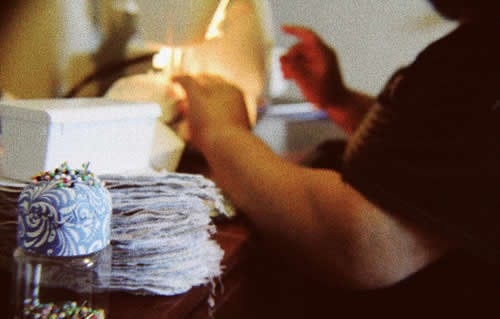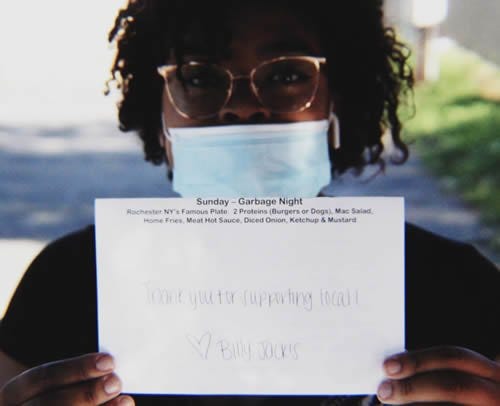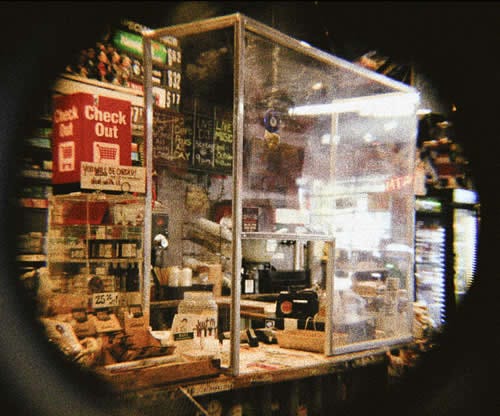When you buy your house online
Plus: Sports teams drop CPI Security as sponsor; Liquor sales strong for third straight month; Covid business photo essay; City Council votes on huge Ballantyne development tonight
Some Charlotte house hunters bought sight unseen in quarantine; Worries about smell, no turning faucets

Michael Wilson and Marilyn Glinka of Montclair, N.J., agreed to buy this house in Belmont in April without seeing it in person. They used real estate websites, Google Street View and a real estate agent to help but admit they were mostly “flying blind.”
by Tony Mecia
Many of the people who agreed to buy houses over the internet during March and April’s lockdown are now seeing their homes in person for the first time — and they say the process was less unsettling than you might think.
For about five weeks, real-estate agents in Charlotte were largely unable to show houses in person. The number of showings fell by 2/3, compared with 2019, according to local data provided to The Ledger by Cottingham Chalk. But the number of houses placed under contract fell only 30% — which means that people kept buying even though they couldn’t visit.
Many scoped out potential purchases on Zillow and other real estate sites, checked out the neighborhood using online tools and took virtual tours with Zoom or FaceTime before signing contracts and putting down money on what could be one of their biggest financial commitments. Real estate agents say some of those habits are sticking, with buyers doing more homework than before.
Montclair, N.J., resident Michael Wilson, 37, and his wife, Marilyn Glinka, had been thinking for a while about moving to Charlotte to be closer to family. They had planned to visit the first week of April to start house-hunting, but then the coronavirus hit. They had a decision to make.
“At some point we just decided, ‘How much longer are we going to wait?’” Wilson says. “Are we going to sit it out up here, or do we just want to make this move, pandemic be damned?”
‘Flying blind’: They went for it. They enlisted a Realtor, studied photos repeatedly, examined Google Street View for a sense of the surroundings and had the interior measured to ensure their furniture would fit. They made a $276,000 offer on a 1,700 s.f., three-bedroom, two-and-a-half bath, two-story house in Belmont, and it was accepted.
“We had some help but were pretty much flying blind on this,” Wilson says. “We are really excited about it, but this is not the way we pictured buying our first home. I’d like to flip on some light switches and turn on some faucets.”
Wilson has his own company, Made Visible Studio, which does design and branding work for breweries, distilleries and coffee roasters, and his wife is a massage therapist.
The couple still hasn’t met their Realtor — Dickens Mitchener’s Marcy Basrawala — because travel has seemed “too sketchy.” And they haven’t seen the house in person yet. They closed on it last week by signing documents virtually and plan to move Friday.
There have always been some buyers who purchase property without seeing it in person. Many are investors or buyers from out-of-state. But local agents say the practice really took off in late March and April.
Unstoppable: Allen Tate CEO Pat Riley says although in-person showings were largely unavailable in April, some buyers couldn’t be stopped and developed workarounds: “Some buyers knew what they wanted, and with homes in short supply, they were going to pull the trigger no matter how the opportunity presented itself.” In those instances, he said agents were able to take clients through closing and “do it safely without human contact.”
Some of those habits are continuing. Because of health concerns, buyers don’t want to visit lots of homes, so they are heading to the internet for information before going in person.
“The thinking is, ‘If I’m going to step out of my house and go through all this stuff, I’d better be serious about this house,’” says Jennifer Saarbach, an agent with Dickens Mitchener.
New data for May is expected this week and should show a big jump in real-estate activity, including houses placed under contract, but slower growth in showings.
From Zillow surfing to home ownership: Living in a 900 s.f. uptown apartment during the pandemic, Alyssa Moore, 25, and Adam Shoulars, 26, figured they should just go ahead and start looking at houses.
“After a month of quarantine, and in an apartment with one bedroom and no balcony or anything, it’s usually not an issue because we’re usually out and about,” Moore says. “Being stuck inside, it was starting to get to us.”
Shoulars, a construction manager, started looking on Zillow. (“Adam is always on Zillow looking at things when he is bored,” says Moore, a dental hygienist.) They found a real estate agent and did two virtual tours, one on Zoom and the other on FaceTime.
“It was definitely a little odd,” Moore said. “You couldn’t really see any details, and you couldn’t touch anything. One of the things my fiancé was nervous about was the smell. Sometimes you walk in a house and it smells funny, or you can tell people smoked in it. We couldn’t get a feel for that.”
They quickly put in an offer on a 1,600 s.f., three-bedroom, two-bath ranch in Huntersville. They paid $260,000 and closed on it last month. They visited twice before closing and said the house looks as it did online, but they realize it was hard to get a sense of the details — like the sizes of the rooms and the vaulted ceilings.
But they’re happy with how everything turned out.
“Our friends who have recently bought homes, they are like, ‘I can’t believe you did that,’” Moore said. “But we did it.”
Panthers, Hornets say CPI Security’s money is no good
The Carolina Panthers, Charlotte Hornets and other sports teams severed ties with sponsor CPI Security over the weekend, following comments from the company’s CEO on police brutality that “a better use of time would be to focus on black on black crime and senseless killing of our young men by other young men.”
CPI CEO Ken Gill made the comments in a private email to the head of Queen City Unity, which seeks to “create a sense of oneness” in Charlotte by pushing for equity and equality and is led by former Democratic City Council candidate Jorge Millares. Queen City Unity called for a boycott, WCNC reported on the comments and Gill apologized … but then CPI’s sports sponsorships started falling faster than the jaw of the surprised would-be burglar when commanded to “Identify yourself!”
The Panthers led the charge late Saturday, and on Sunday, N.C. State, the University of South Carolina, the Charlotte Hornets and the Charlotte Knights followed.
In an unusual twist to a boycott, the moves by the sports teams to cut loose a big sponsor will probably save CPI Security hundreds of thousands of dollars a year, if not millions. Sports sponsorships are expensive, and their benefits can be hard to quantify. Still, the controversy is a blow to CPI’s image, and it’s going to need a new ad strategy after it’s done spending some money on crisis PR. And who knows how many customers or employees it might lose.
CPI offering customer credit? A Ledger reader interested in canceling said he called the company Sunday and that “their offer was a month credit for monitoring and that they will follow up with a phone call after that to discuss what changes they will be making. They must be getting a ton of these phone calls.”
Just wait until people learn that the new YMCA planned for Steele Creek is supposed to be called the Gill Family YMCA. Gill and his wife donated $3M. —TM
Today’s supporting sponsor is T.R. Lawing Realty:

Liquor-store sales brisk for third straight month
As restaurants in Mecklenburg County started to reopen last month, liquor sales at ABC stores remained strong.
Sales rose 14% in May, compared with a year ago, the county ABC Board told The Ledger. Sales rose 13% in April and 29% in March. Being cooped up in the house all day with nowhere to go will produce those kinds of numbers.
And for the first time since the middle of March, the ABC Board reported sales to restaurants. Those accounted for $585,000 in May, about 1/10th of the amount last year. —TM
Photo essay: Supporting businesses in the Covid era

Continuing with our weekly photo essay series in partnership with our friends at The Biscuit, this week’s photographer is Yanira Fuentes.
She shares personal images she took a few weeks ago of how Covid-19 has affected the people and the places she holds dear. Her use of close-up, intimate, almost claustrophobic framing underscores how this viral outbreak has invaded every aspect of our lives.

My mom has been making masks for our family. She’s sent her masks to California for my aunt as well. This is what she’s been doing during quarantine and enjoying it so much. She’s also donated a couple to my job (veterinary clinic).

These are some shots I took in NoDa, one of the places where my friends and I would come hang out from time to time. Stumbled upon a Billy Jack employee as she was working during the pandemic. The sign says “Thank you for supporting local!”

The impact on many local businesses has become beyond unbelievable. To see them continue to push through and look out for local customers and their employees is amazing. That’s love.

Oh, Common Market. This one was very impactful. You never really think about how much a location can mean to you. As a landmark in Charlotte, this holds very much importance to community, family and friends. Seeing it empty was very heartbreaking. But seeing the boys again was beyond amazing. Regulars love CM. We love Charlotte, and we all support each other.
Each week, The Biscuit and The Ledger offer views of neighborhoods and communities across the city through the eyes (and lenses) of local photographers.
For the dad who has ‘everything’
Does he have smart, original, business-y Charlotte news and insights delivered to his inbox? Shouldn’t he?
For Father’s Day, consider a gift subscription to The Charlotte Ledger. A paid subscription offers full access to exclusive news delivered in a way that won’t waste his time.
In brief:
Stressful test: Prospective lawyers taking North Carolina’s bar exam this year have to sign a waiver that “acknowledges and voluntarily assumes all risk of exposure to or infection with Covid-19 … and the possibility that such exposure or infection may result in personal injury, illness, permanent disability, and death.” North Carolina’s board of law examiners said test-takers must bring their own masks and hand sanitizer to the in-person exam, to be held July 28-29 in Raleigh. In a statement last month, the board said it understands concerns about Covid are “a source of additional stress.” (Above the Law)
Bar lawsuit: Several Charlotte bar owners say they’re hopeful that their lawsuit against the state will allow them to reopen soon. The owner of The Dog Bar in NoDa says “All we want is a chance to stay in business,” and the operator of Jeff’s Bucket Shop on Montford Drive says staying closed has been “financially devastating, emotionally devastating.” (Biz Journal)
Cam’s condo: Cam Newton’s three-bedroom condo in the Trust building uptown is on the market. Asking price: $2.9M. (Agenda, with photos)
Vote tonight on Ballantyne plan: Plans for a huge rezoning in Ballantyne are scheduled for a City Council vote tonight. Developer Northwood Office is proposing to rezone 454 acres that includes portions of the Ballantyne hotel, Ballantyne Corporate Center and golf course. The development, called “Ballantyne Reimagined,” calls for building a mix of retail, office and 2,000 apartments in two phases. Last month, Northwood proposed adding affordable housing to address the city’s concerns.
Will city budget include tear gas? The City Council is expected to vote on the city’s 2020-21 budget tonight. It keeps property tax rates the same, cuts no core services, includes no layoffs and raises top pay of police officers and firefighters. Council member Braxton Winston has proposed defunding police tear gas but said on Twitter over the weekend that didn’t have the votes.
Mass transit uncertainty: Public transit ridership in Charlotte plunged 67% in April, and the Charlotte Area Transit System expects fare revenue to fall by $8M this year. It’s unclear when riders might feel safe returning, which casts a cloud over future projects such as a new light rail line and upgrading the bus system. “God only knows how this is going to shake itself out,” says former CATS CEO Ron Tober. (Agenda)
Huntersville park-and-ride: The Charlotte Area Transit System plans to acquire 23 acres in Huntersville off I-77 for a future 511-space park-and-ride lot and a bus bay for six buses. The parcel is at 11100 Hambright Road.
Big bond: The City Council is expected to approve a plan for a $197M bond referendum on November’s ballot at its meeting tonight. It would consist of $102.7M of street bonds, $44.5M of neighborhood improvement bonds and $50M of housing bonds.
Taking stock
Unless you are a day trader, checking your stocks daily is unhealthy. So how about weekly? How local stocks of note fared last week (through Friday’s close), and year to date:

Need to sign up for this e-newsletter? Here you go:
Got a news tip? Think we missed something? Drop us a line at editor@cltledger.com and let us know.
Like what we are doing? Feel free to forward this along and to tell a friend.
Archives available at https://charlotteledger.substack.com/archive.
On Twitter: @cltledger
Sponsorship information: email editor@cltledger.com.
The Charlotte Ledger is an e-newsletter and web site publishing timely, informative, and interesting local business news and analysis Mondays, Wednesdays, Fridays and Saturdays, except holidays and as noted. We strive for fairness and accuracy and will correct all known errors. The content reflects the independent editorial judgment of The Charlotte Ledger. Any advertising, paid marketing, or sponsored content will be clearly labeled.
Executive editor: Tony Mecia; Managing editor: Cristina Bolling; Contributing editor: Tim Whitmire; Reporting intern: David Griffith


